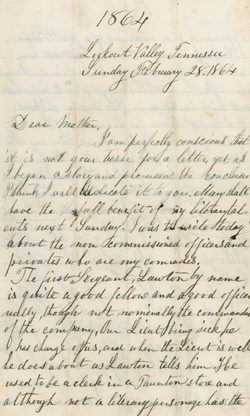Collections Online
Letter from Edward Louis Edes to his mother, 28 February 1864
To order an image, navigate to the full
display and click "request this image"
on the blue toolbar.
-
Choose an alternate description of this item written for these projects:
- Main description
[ This description is from the project: Civil War ]
"I think in most points we have the best non-commissioned officers in the reg't" writes eighteen-year-old Edward L. Edes, a newly promoted corporal in the 33rd Regiment Massachusetts Volunteer Infantry in this 28 February 1864 letter to his mother, Mary, describing in detail the personalities of the sergeants and the other non-commissioned officers stationed with him in Lookout Valley, Tennessee.
Edward Louis Edes was born on 19 November 1845 in Bolton, Massachusetts, to Reverend Richard S. and Mary Edes, the second of five children who included Elizabeth, Sophia, Mary, Francis, and Robert. Edes was a farmer in Bolton and only sixteen years old when he enlisted in the Union Army on 23 June 1862. He was mustered in service on 5 August 1862 and promoted to the position of corporal with the 33rd Massachusetts on 28 February 1864.
The 33rd Massachusetts was organized at Camp Edwin Stanton in Lynnfield, Massachusetts, in June and July of 1862. The 33rd Massachusetts fought at the second Battle of Bull Run, Chancellorsville, and Gettysburg. Subsequently, the regiment was sent to Tennessee to serve with the Army of the Cumberland. After the battles of Lookout Mountain and Missionary Ridge in the late fall of 1863, the regiment went into winter quarters in Lookout Valley, Tennessee, where Edes spent time getting to know his fellow soldiers who ranged in age from seventeen to fifty years old.
Edes opined that while he thought very highly of the non-commissioned officers in his regiment, the officer corps of the Union army was primarily made up of "narrow minded, underwitted, vulgar drunken" men. Edes recounts that the Captain (in all likelihood, Albion Tebbetts of Boston who served as Captain of the 33rd Massachusetts from 29 November 1862 to 18 September 1864 when he was commissioned as a Major), instead of applying harsh physical punishment to wayward soldiers, chose to speak to these soldiers "as human beings." Consequently, Edes writes with pride that the 33rd Massachusetts had fewer soldiers being disciplined due not only to the soldiers generally performing their duties, but also to the officers' humane and rational treatment of those who engaged in misconduct or insubordination.
Describing his "great crony" Sergeant Obed Johnson, a shoemaker from Sharon, Massachusetts, Edes writes that he "is a kind-hearted man" who cared about the well-being of the average soldier. Edes notes that he and Obed discussed "military, civil, and religious" topics, adding that Obed was a "man of good principles" and a "fit companion for any fellow." Sergeant Francis Lawton, a clerk from Taunton, Massachusetts, was considered by Edes to be a "good fellow and a good officer," with the "manners of a gentleman." Edes describes William West, a corporal from Watertown, Massachusetts, as a "Blue Nose" whose "principal trouble is having been called a 'big Yank' by one of the western men when we marched through Chattanooga."
During the last week of June of 1864, Edes fell ill with what was subsequently diagnosed as typhoid fever. He was admitted to a hospital in Chattanooga, Tennessee, on 30 June 1864 and died three days later. His papers include the telegraph sent to Massachusetts on 15 July 1864 announcing his death.
Sergeant Johnson, of whom Edes so fondly spoke, wrote moving letters to Edes' father after Edward's death. These letters demonstrate an affection for the entire Edes family, whom Johnson said he came to know through Edes' stories and recollections. In addition, he informs the family that while he initially thought that Edward was just another average young recruit, after spending time with him, he (Obed) came to appreciate and respect Edes' sharp wit and intelligence. Graciously reciprocating Johnson's kindness, Edes' mother sent him a daguerreotype of her son which became one of his treasured possessions. In a letter dated 9 July 1864, Peter Sears, the senior Commanding Officer of the 33rd Massachusetts, Company B, wrote that "Edward was a true, brave soldier possessing uncommon intelligence and ability, he appreciated the magnitude of this struggle, and worked faithfully and willingly. By his good soldierly conduct and his true worth, he garnished the love and esteem of all who knew him."
Sources for Further Reading
The featured letter (and other letters mentioned in the text) are contained in the Edward Louis Edes Letters, 1861-1865.
Additional information on Edward L. Edes and his family can be found in the Edes Family Papers, 1783-1874.
Boies, Andrew J. Record of the Thirty-third Massachusetts Volunteer Infantry: from Aug. 1862 to Aug. 1865. Fitchburg, Mass.: Sentinel Publishing Co., 1880.

